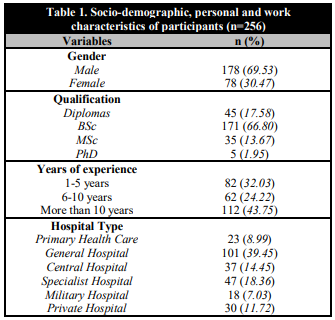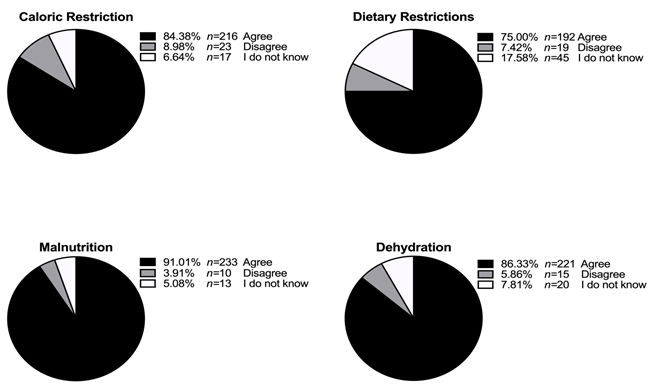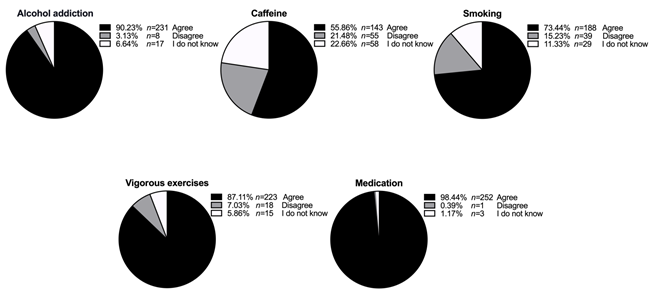INTRODUCTION
When performing laboratory tests, various non-health-related factors could influence their results; furthermore, interpretation of test results varies between laboratories and depends upon the reference interval. Notably, reference intervals are generally determined by enrolling healthy adults aged between 20-40 years [1]; thus, aging is considered to be among the complicating factors that affect laboratory test results. Interpretation of elder patients' laboratory results in particular is also complicated by factors including but not limited to: alterations in physiology of the elderly body, chronic age-related diseases, diet-related issues, and habit alterations [2]. Aging is not the only factor that may alter laboratory evaluation results; other potential contributing factors include gender, alcohol intake, diet, and stress [2]. Critical examples include physiological changes related to pregnancy, which have been documented to affect several biochemical tests; awareness of these effects is essential, and reference intervals specific for pregnancy remain an unmet need [3]. In addition, transitions through stages of life from newborn to elder, such as the process of puberty, represent complex physiological changes; understanding age-related effects on laboratory test results, along with the influence of age on differing disease-related impacts and/or on non-disease-related impacts, could increase the accuracy of diagnosis [4].
As an illustrative case in point, consider an athlete following a calorie restriction program in preparation for a competition. Typically, such a program for rapid bodyweight reduction starts 3-5 days before a competition and constitutes a combination of intensive training in a plastic or rubber suit, vomiting, diet pills, and using saunas [5]. Thus, such a program could cause changes in laboratory findings regarding hormones and immune parameters [5]. Another example is a vegan who excludes animal products from their diet; as animal products are the only source of vitamin B12, such individuals are at greater risk of B12 deficiency and related diseases [6]. Such an exclusion of foods from the regular diet for any reason could affect laboratory test results unless compensated for with pills or fortified food. As a third example, alcohol [7], smoking [8] and high consumption of caffeine [9] can also impact laboratory test results. Although alcohol consumption is prohibited in Saudi Arabia, its effects on different body organs can be assessed by several biochemical and hematological tests [7]. The degree to which laboratory professionals are aware of alcohol as a factor that could change laboratory test results is of interest. Although these factors are not pathological causes, laboratory practitioners are expected to be aware of their adverse effects.
Accordingly, the present study aims to assess the knowledge of laboratory professionals regarding non-pathological factors that may impact laboratory test results, and furthermore the extent of their awareness concerning how to manage samples with suspect results.
METHODS
This was a cross-sectional survey conducted among medical laboratory practitioners from public and private health care facilities in different regions of Saudi Arabia during the months of April and May 2021. The study included 256 participants, and data was collected using a questionnaire that was designed and then reviewed by researchers and professionals in the medical laboratory field, affirming the validity and simplicity of the study questions. For better understanding and evaluation, survey questions were circulated to participants in Arabic language and then translated into English. The final reviewed version of the questionnaire was distributed among medical laboratory practitioners in multiple health institutions and cities across Saudi Arabia. It included a description of the study to brief participants about the study's objectives and how they may benefit. Participants were also informed that the questionnaire would not collect any personal identifying information, that they can choose to not participate, and that even if choosing to participate, they are able to stop or withdraw their response at any time. Inclusion criteria for this study were as follows: major specialty in medical laboratory and having at least one year of work experience. Participants having any specialties other than medical laboratory were excluded. The study population consisted of 500 medical laboratory professionals from all around the kingdom of Saudi Arabia.
The questionnaire was divided into three sections: the first covered participant demographic details such as sex and years of experience, the second participant knowledge of factors that may affect laboratory findings, and the third participant attitudes toward dealing with factors that may influence the interpretation of results. Participant knowledge was assessed by means of 12 questions about patient factors such as aging, pregnancy, puberty, and calorie restriction. Each question had three possible answers of agree, disagree, and I do not know. Participant attitudes were assessed through five questions having the same three possible answers.
Ethical approval for the current study was obtained from the Ethical Committee of Scientific Research at King Khalid University with approval number ((HAPO-06-B-001)-ECM#2021-5407). Participants were informed that collected data will be confidential and that they can withdraw their responses at any time.
The data was automatically collected and managed by a survey data collection website, making the data entry process easier and more accurate. The website also has the capability to analyze collected data and display it as percentages and frequencies. Data were then entered into GraphPad Prism (GraphPad Prism version 9.00 for Mac, GraphPad Software, San Diego CA) for descriptive analysis, through which it can be presented in a variety of graph types for easier interpretation.
RESULTS
The knowledge of clinical laboratory professionals concerning factors that could influence laboratory test results was examined by means of several questions categorized into two crucial aspects, knowledge and attitude. The study considered personal habits, biological variations, medication use, and disease-related factors. The socio-demographic, personal, and work characteristics of participants are listed in Table 1.
Table 1. Socio-demographic, personal and work characteristics of participants (n=256)

BSc: Bachelor of Science; MSc: Master of Science; PhD: Doctor of Philosophy.
Concerning biological factors that could affect laboratory testing results, including aging, pregnancy, and puberty, participant responses were variable; more than half agreed that aging, pregnancy, and puberty may influence laboratory assessments, as shown in Figure 1. In addition, questions were presented regarding eating habits or disease-related factors, to which participants generally agreed that not obtaining sufficient nutrients from food and drink due to either exclusions or diseases imposed crucial effects on test results (Figure 2). Finally, personal habits such as consuming alcohol, smoking, training vigorously, and using of medication were considered by most participants to influence clinical laboratory test results (Figure 3). However, only half agreed that consuming high amounts of caffeine affects test results.

Figure 1. Knowledge of medical laboratory practitioners concerning biological factors that affect laboratory testing results (n=256).

Figure 2. Knowledge of medical laboratory practitioners concerning dietary habits that may affect laboratory testing results (n=256).

Figure 3. Knowledge of medical laboratory practitioners concerning personal habits that may affect laboratory testing results (n=256).
The attitudes of medical laboratory practitioners regarding steps that should be considered and undertaken in the context of abnormal or extraordinary laboratory test results are given in Table 2. Most of the participants (98.44%) agreed to check the patient history of an examined sample. This was followed by accord concerning checking sample condition, storage conditions, and transport, at 95.70% of participants. In addition, 80.08% of participants choose to retest the same sample, and 78.91% to request a new sample for a retest. We further asked participants whether, when abnormal results are obtained from laboratory tests, they send the report to the physician immediately without any further address being made. Only 14.84% agreed, while 82.81% believed that further steps need be taken prior to sending such reports to the receiving department.
DISCUSSION
Medical laboratory tests are the first line in evaluating patient condition whether with or without symptoms. Such tests provide a general overview of patient status and assist physicians in the diagnosis and management of disease and its prognosis [10]. More importantly, current advanced laboratory testing significantly reduces the diagnostic errors made by physicians and provides for the accurate evaluation of patient health [11]. However, pre-and post-analytical errors can occur, even during evaluation of the analysis, may affect laboratory testing results and consequently have downstream effects on patient medical diagnosis and management [12]. The present study aimed to highlight the knowledge of clinical laboratory professionals and their attitudes toward, and actions taken when obtaining unexpected test results. The evaluation involved questions on factors that could influence test results and on the proper attitude toward controlling them. The study population comprised male and female medical laboratory professionals having different qualifications and working in different healthcare settings, which diversity could assist in providing a more reliable overview of the knowledge and attitudes of practitioners.
Variable responses among participants were observed with regard to physiological factors; the majority agreed that pregnancy could impact laboratory test results, as was expected. Although most of the participants were male, it appears that regardless of gender, laboratory practitioners have outstanding knowledge about the effect of pregnancy on laboratory results. Less expected was the finding that laboratory professionals more frequently provided incorrect answers in the context of puberty and aging, with the remainder either disagreeing or expressing a lack of knowledge. One possible reason is that the majority of responses came from staff working at public hospitals, which are regularly visited by pregnant women for regular checkups. This builds a better body of experience regarding the effect of pregnancy on laboratory results.
Beyond physiological factors, diet-related factors such as caloric restriction, food prohibition, and dehydration influence test results. Participants showed outstanding responses in this respect, more so than for physiological factors. This subject-related variation in responses could be due to the level of education among participants as well as the teaching system. Namely, institutional courses focus mainly on pathological factors rather than physiological factors, as well as level of education interventions by the health sector such as education training program. Another possible explanation is that teaching systems do not connect theoretical information to practical problems. Such connections are important for students to develop good skills and assure analytical quality [13]. In addition, the survey evaluated participant knowledge concerning personal habits such as smoking, alcohol consumption, caffeine consumption, vigorous exercise, and use of medication. The responses showed agreement among participants that alcohol consumption, medication use, and vigorous exercise impact laboratory test results; however, less accord was seen concerning smoking and high caffeine consumption. This may be attributed to discrepancies in study results concerning the use of caffeine and its impact on human health [14] and on the slow effect of smoking.
The study also assessed the attitudes of participants concerning unexpected or abnormal laboratory results, namely the actions taken upon obtaining abnormal or unexpected results. Generally, tests that return abnormal results must be validated by the senior of the department before being transferred to the intended clinic. However, strongly unexpected or serious results also require a preventive control step as decisions based on laboratory tests contribute to disease management; errors in such decisions could thus lead to serious complications. As expected, the majority of participants are aware of steps for the troubleshooting and validation of tests, particularly when patient results are suspect. The medical history of a patient constitutes the upstream line of patient condition management, while laboratory results comprise the downstream line [10]. One explanation of the outstanding attitudes of participants is their experience, as many participants had more than ten years of experience. This contributes to better troubleshooting and validation of suspect laboratory test results. It is essential to obtain correlated laboratory test results that fit the patient's history or clinical symptoms; thus, to save time and be cost-effective and accurate, clinical laboratory practitioners should be familiar with the patient's medical history, particularly when obtaining unexpected results.
CONCLUSIONS
The current study revealed that medical laboratory professionals in Saudi Arabia possess solid knowledge regarding factors that may affect laboratory testing results. In addition, staff attitude assessments demonstrated that they undertake suitable actions when unexpected laboratory results are obtained. However, medical training program interventions remain required to preserve medical laboratory practitioners' skills and achieve higher-quality healthcare.














